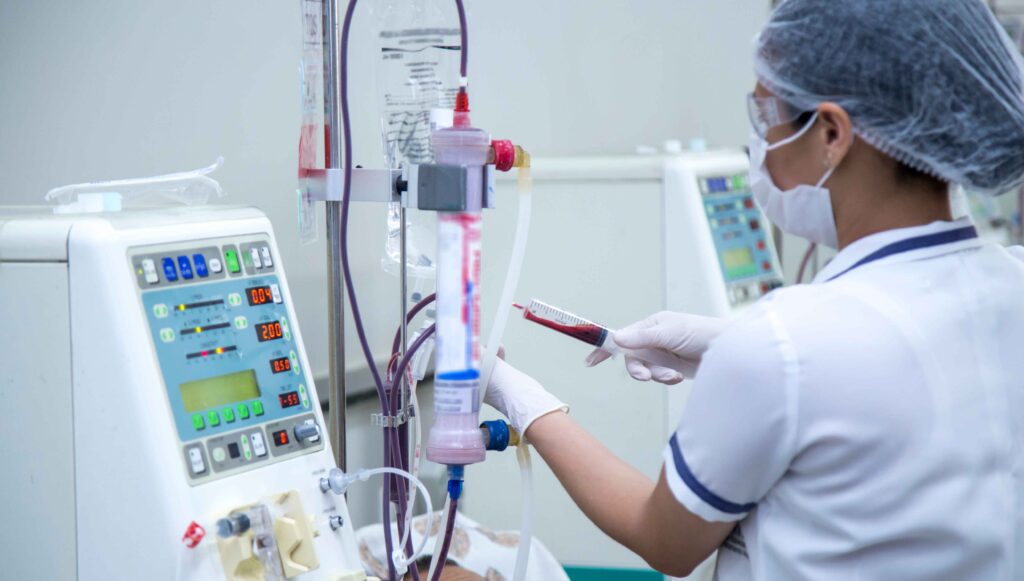What You Need to Know about How Does Diet Affect Anemia. Diet plays an important role in controlling anemia during dialysis by affecting the balance of crucial nutrients such as iron and folate, which are required for producing red blood cells. Dialysis patients need more iron supplementation because of blood loss and treatment with anemia drugs.
Nutrition and Dialysis Anemia Management
Each time I walk into a dialysis unit, I first remind myself that the concerns I’d like to discuss with my guests today might not be their agenda either.
When you’re not getting enough oxygen, you don’t have energy and you might feel one or a combination of the following:
- Weak and fatigued
- Shortness of breath
- Racing heartbeat
- Clouded thinking
- Dizziness
- Chest pain
Also Read: How to Live Longer on Dialysis?
Can we obtain sufficient iron from what we eat?
I did a random walk through foods at the busy store in the city to list out some facts to share with you in case the said product will enhance your iron level (since most of you ask me numerous times). Prominent foods as sources of iron:
- Health drink powders
- Breakfast cereals in morning meals
- Diabetic health mixes
- Dates
- Whole wheat flour
All breakfast cereals in the morning contain 1mg of iron per serving, which accounts for 3% of Recommended Daily Allowance (RDA) for regular adults. Health drink powders consist of 1.3 to 1.8 mg of iron per serving.
Diabetic health mix contains 1.5 to 1.7mg iron per serving and don’t forget all the high phosphorus and calcium loaded in this product. Dates contain 2.2mg of iron per serving and moderate levels of potassium, calcium and phosphorus.
Having two more servings to fulfill the requirement for iron will raise blood levels of potassium. Two more servings will be 430 mg of potassium, which can be lethal when added with the standard meal routine.
Eating three whole wheat flour rotis will fulfill 12% RDA for iron. One cannot keep adding the number of rotis to add iron levels since most of them are diabetics and many of them do not have excellent appetite.
Proper protein and total calorie intakes are required for red blood cell development. Iron rich minerals are present in protein rich food that assists in making hemoglobin. Protein rich red meat, leafy green vegetables, and eggs are a good option.
You may customize your plan by consulting a dietician for iron rich foods to maintain the continuous supply of iron. Yet, with diet alone, your requirements for iron might not be achieved because of dietary limitations, inadequate appetite and absorption.
Also Check: Why You Should Never Skip or Delay Your Dialysis Treatment
Things to Recall
Be aware of your overall calorie and protein requirements for red blood cell production.
Learn to eat your entire calories and protein requirement.
Accumulation of the waste in the blood stream can reduce the life span of the available RBC, so never skip or reduce your dialysis session.
Learn to eat from your dietician in order not to accumulate too much waste in the blood in case you are not coming for regular treatments.
Take your renal multivitamin tablet on a regular basis which contains folic acid, iron, and vitamin B12.
Conclusion
Treating anemia in dialysis patients calls for more than mere diet change; it needs to be balanced with proper nutrition, sufficient dialysis, and prescribed iron or epo treatment. How Does Diet Affect Anemia Control During Dialysis Treatment? Although nutritious food is helpful in aiding the production of red blood cells, diet alone will not suffice in most instances.
Frequently Asked Questions
Q. How do dialysis patients manage anemia?
Dialysis patients currently manage anemia primarily with a regimen of erythropoiesis-stimulating agents (ESAs) and iron supplements.
Q. Does diet affect dialysis?
Yes, diet plays an important role in dialysis by influencing fluid balance, waste accumulation, and overall health during the treatment.
Q. How to increase hemoglobin in dialysis patients naturally?
Dialysis patients cannot raise hemoglobin naturally without medical oversight, since they need special treatment for anemia management, including IV or oral iron and erythropoiesis-stimulating agents ESA.
Q. What is the minimum hemoglobin level for dialysis patients?
In the majority of situations, treatment of anemia among adult dialysis patients should be initiated when hemoglobin levels are below 10 g/dL.
Q. What foods are high in iron for dialysis patients?
Dialysis patients can use heme iron foods, such as lean meat, poultry, and fish, which the body is able to absorb better.



